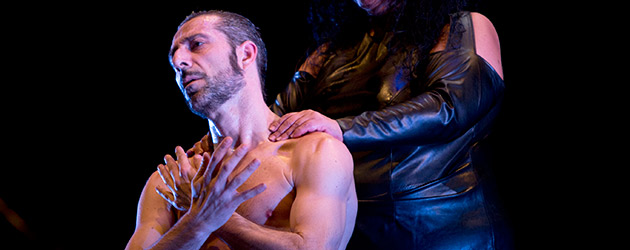Text: Estela Zatania
Photos: Jean-Louis Duzert (C)
Tuesday, January 14th, 2014. 8:00pm Teatro Bernadette Lafont, Nimes (France)
“Whatever comes from reason, cannot be trusted”
We arrived in Nimes, France, Gallic home of the “duende”, for the second week of its admirable festival, now in its twentieth year. Last week the recently baptized Theater Bernadette Lafont and the Teatro Odeón received the performances of people like Israel Galván and Isabel Bayón, in addition to José Galán, Argentina and David Lagos with Melchora Ortega among others, and the program offers a varied assortment of parallel activities with work-shops, master-classes, cinema, documentaries, lectures and exhibits.
On Tuesday night, Seville dancer Andrés Marín presented his work “Tuétano”, with the unexpected and unfortunate absence of Macanita who was unable to make the trip for medical reasons. There were still the singular personalities of José Valencia singing, Antonio Coronel for the percussion, the versatile Raúl Cantizano on electric guitar and zanfoña and Concha Vargas as a dark Venus.
In France, Marín has reached levels of popularity and prestige that his own country has been reluctant to give him. His constant experimentation, and the need to conceptualize dance take him along risky paths, not always tolerated by the average flamenco fan. This work, “Tuétano”, which he presented at the last Bienal de Sevilla, demands the complicity of the spectator. In fact, every step of the way it’s teeter-tottering on the divide that separates experimental flamenco from theater, and this time theater seems to have come out on top. Or at least that’s how it seemed last night.
The work has evolved since the Bienal de Sevilla. If feels denser and more impenetrable. The impressive José Valencia smoothed over Macanita’s absence, but we needed the voice and physical presence of that flamenco lady to balance the generalized oppressive darkness. Marín, who hardly leaves the stage at any point, dances bare-chested resembling a flamenco Spartacus. Concha Vargas’ role is not clear, more than dance, she acts in movement like a dark omen of something indefinable and possibly threatening. With so few players in the cast, the absence of one alters the balance of the work, hence its meaning.
Some of the most flamenco moments were provided by Cantizano with his granaína and petenera on electric guitar, proving that the quality of “flamenco” doesn’t depend on specific instruments, but rather it is a state of mind.
And Marín’s pranks… The footwoork, or is it “fingerwork”, executed with metallic nail extensions on a metal plate he wears on his face…the two little plasic bags of water with goldfish swimming around, carried by José Valencia like a surrealistic Málaga fisherman…the black shirt Marín partially pulls over his head to cover his face, condemned man and executioner all at once. Andrés the genius knows the impact of quotidian objects placed in unlikely situations: familiar elements are deformed, chewed up and spit out in a transformed state.
But what most people talk about upon leaving the theater, the touch of calculated madness, is the chickens. All of a sudden they’re there, four live chickens pecking around the stage as if they were home on the range, one of them tranquilly nested in Marín’s top-hat, and each of the four appears completely unaware of its role in the post-modern universe of a creative dancer called Andrés Marín. The birds’ indifference, downright hilarious, like it or not, gives a feel of performance art, what we used to call a happening, and it’s a wake-up call for those of us who are struggling to decipher the symbolism of the work. Some people in the audience, both in Seville and Nimes, didn’t quite accept it, too bad for them. From the long texts read off-stage or by Marín, the following seemed to summarize the message: “whatever comes from reason, cannot be trusted”.
In this version and performance of “Tuétano”, it’s hard to detect the characteristic aroma of flamenco. However Andrés Marín a fine dancer and inspired visionary who demonstrates just how much he loves flamenco at the end of the show when he sings por soleá, not like a show-off…you can barely tell it’s him…but as yet another element to enhance the work.
